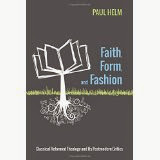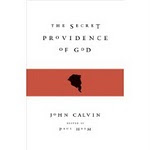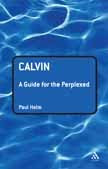All those whom God hath predestined unto life, and those only, he is pleased, in his appointed and accepted time, effectually to call, by his word and Spirit, out of that state of sin and death in which they are by nature, to grace and salvation by Jesus Christ; (WCF: 'Of Effectual Calling').
Since a few remarks that I made on Calvin on Ephesians 2 have aroused interest, I thought I might revisit these and add a comment or two by way of clarification. The original passage is as follows:
So the truth
about atonement, about reconciliation to God, has to be represented to us as if
it implied a change in God, and so an inconsistency, an apparent contradiction,
in his actions towards us. But in fact there is no change in God; he loves us
from eternity. There is however, a change in us, a change that occurs as by
faith Christ's work is appropriated. The change is not from wrath to grace, but
from our belief that we are under wrath to our belief that we are under grace. (John Calvin's Ideas, 395)
So for Calvin when
unbelief turns to saving faith there is no change in God, but in the one whose
state changes. His his status, that of
being eternally loved by God, a child of grace, does not.
This is a good instance of how the eternal decree operates in the case of God's grace. The decree is fixed
‘in heaven’, eternally. The outworking of the decree is in time, as men and
women change and are changed, by being brought to penitence and saving faith.for example.
Scott Oliphint
asks a question or two about this, and then proceeds, quite understandably, to provide his
own answers. But it is not quite as he surmises.
Does Helm mean to
say (or does he argue that Calvin says) that when Scripture says that God's
people were under wrath prior to their conversion (e.g., Eph. 2:3), that
what we're meant to think is only that we believed we were under
wrath? And are we then meant to read Scripture so that, at conversion,
our belief changed to thinking we are under grace? We are surely not
to think, says Helm, that God's disposition toward us has changed from wrath to
grace. This "necessary consequence" of God's electing love is no
"good consequence" at all. It denies the reality of salvation in
history. Does Scripture really enjoin us to think of God's wrath or his grace
as having its focus in our beliefs and not in God's covenantal disposition
to man? Does Scripture really want us to believe something that is
not, in fact, the case?
(http://www.reformation21.org/articles/tolle-lege-a-brief-response-to-paul-helm.php)
(http://www.reformation21.org/articles/tolle-lege-a-brief-response-to-paul-helm.php)
I make two points
in the paragraph, both of them on behalf of Calvin. One – as we have just now
seen - is that the movement from wrath
to grace involves no change in God but one in human beings. This is consistent with
my understanding of Calvin, that the decree of God is eternal and by it
everything that is to come to pass does so.
And the second
point is this: that until such time as people are changed they have no grounds
for thinking that they are in the hands of a gracious God. God knows, 'he knows
those that are his’, but they don’t yet believe it. Any belief to this
effect is as they presently stand, under wrath, an ungrounded belief. When ‘as by faith
Christ’s work is appropriated’ and a person changes, profoundly so, a person is then entitled to believe that God’s love
for him did not start with his conversion, or shortly before this, but that (to
his astonishment) he was eternally loved by God. Like Paul he may come to think
that God separated him from his mother’s womb, and called him by his grace. One God, one purpose. Thus
a person believes, or may come to
believe, that his change is due to eternal election, and what has followed this in time.
This is entirely consistent with what Calvin says elsewhere. For one other thing that Calvin believes is that ‘Christ is the mirror of our election’, (Inst. III.24.5) and it is as we are ‘in communion with Christ’ that we are entitled to believe that we are elect. So the normal way, Calvin says, is that God provides evidence to a person that they enjoy communion with Christ, and this grounds their conviction that they were eternally loved by God, ‘chosen in Christ before all ages”, and (to go on a bit) this love before all ages took the form of leaving him for a while in his state of sin and misery until God the Holy Spirit regenerated him.
This is entirely consistent with what Calvin says elsewhere. For one other thing that Calvin believes is that ‘Christ is the mirror of our election’, (Inst. III.24.5) and it is as we are ‘in communion with Christ’ that we are entitled to believe that we are elect. So the normal way, Calvin says, is that God provides evidence to a person that they enjoy communion with Christ, and this grounds their conviction that they were eternally loved by God, ‘chosen in Christ before all ages”, and (to go on a bit) this love before all ages took the form of leaving him for a while in his state of sin and misery until God the Holy Spirit regenerated him.
So the belief that
he was eternally loved has the form of an inference, it is not formed in one
step that God eternally loved him, nor is regeneration the forming of the
belief that God has loved the one regenerated eternally. Rather that he is
Christ’s by faith exercised in real time! For just as eternity is timeless, so the application of redemption is timely. As as he comes to recognize that he is in Christ, which
may occur in a moment of time, or may take more time, he comes to see that he is eternally
loved by God, child of grace.
I’m not sure what ‘denying
him the reality of salvation in history’ means, but I most certainly affirm that
Calvin thought that the appropriation of salvation occurs in real time. God
being timeless does not change, but we
are always changing. As I say over the page, also on behalf of Calvin, ‘God
does not change. But we change when, by the exercise of faith, we experience
restoration to the favour of God’. (396)
I hope that this
covers Scott’s questions.









